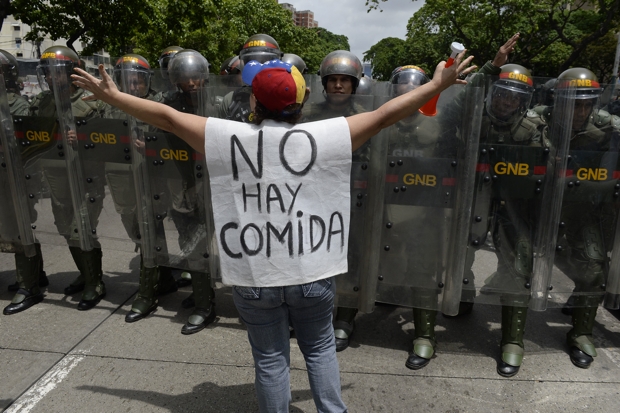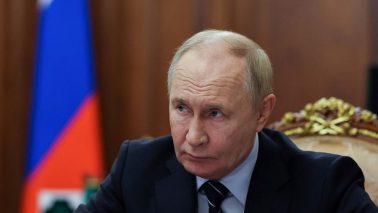It’s hard to imagine now but just decades ago Venezuela was the richest country in South America. The late President Hugo Chávez’s social programs thrived on record oil revenues; Venezuelan industry was left underdeveloped but poverty was glitteringly – yet only temporarily – relieved. Now that the price of oil has plummeted, the country’s hollow economy is dependent on imports it does not have the cash to buy. Normally reliable Chinese lenders are having second thoughts. Inflation has hit triple digits. Venezuela’s economy is in utter recession and is projected to contract eight per cent this year, making it officially the slowest-growing economy in the world.
The litany of consequent disasters is almost routine now. There are massive shortages of everything from bread to fruit to nappies. Venezuelans end up waiting in line for hours at the supermarket only to find the shelves empty. Blackouts are frequent. Hospitals struggle to stock basic medicines. Infant mortality is rising and once-quashed malaria is back. Families stay in bed to save calories, women are seeking sterilisation because raising children is getting to be impossible, and on that note, reports of infanticide are going up. Meanwhile, much-needed foreign aid has not been permitted to enter the country.
Even if he disregards the economic crisis, President Nicolás Maduro can’t ignore the political one; protests have been going strong for about two years now. And the political opposition, a rainbow of popular factions but most strongly represented by frequent presidential candidate Henrique Capriles, led an enormous rally on 1 September called the ‘Taking of Caracas’. The protesters called for a recall referendum to put Maduro out of office, and though popular opinion was on their side, logistics never were. The electoral commission’s timeline would likely delay the recall vote until after 10 January, when a recall would no longer trigger new elections but instead simply replace Maduro with his vice president, radical academic Aristóbulo Istúriz.
Clearly, though, Maduro’s administration is feeling the heat—and furiously cracking down on opposition. The Supreme Tribunal (Venezuela’s highest court) nullified all acts passed by the National Assembly, leaving the country functionally without a legislative branch. The opposition had won last year’s legislative elections in a landslide, and the Assembly was their only real voice in Venezuela’s government.
It’s hard to imagine such authoritarianism will bolster Maduro’s plummeting support. Still, this same right-wing opposition tried a recall referendum against Hugo Chávez in 2004 and lost by a significant margin. The people are overwhelmingly against Maduro – his socialist party was trounced in the last legislative elections, and polls show 80 per cent of the population would vote to remove him – but that hasn’t translated into support for the right, which is still associated with a disastrous neoliberal turn in the nineties.
Yet in some ways the nullification of the legislature is only a formality. Maduro has already been ruling over this chaos as a true authoritarian. A particularly controversial decree passed by the agricultural ministry gave the government power to ‘reassign’ workers at will – which Amnesty International said effectively amounted to ‘forced labour’. Unjust imprisonment of political prisoners, including opposition leader Leopoldo López, has been met with international outrage, but to no avail. In addition, the military grows stronger by the day. Maduro has appointed General Vladimir Padrino López to lead the ‘Sovereign Supply Mission’, which put the military in charge of addressing shortages, inextricably linking the fates of the armed forces and the administration. Fears of military repression are stirring, though the military has no particular reason to prefer Maduro to his vice president. They will likely guarantee a delayed recall vote, but nothing more.
That’s what Venezuelan politics has been about for years now – delaying the inevitable. Maduro is no Chávez, and his successor won’t be either. There is a sense that Venezuela is coming to the end of an era. Latin America as a whole certainly is: the trend toward leftist, personalist leadership, the so-called ‘pink tide’ of which Chávez was the ringleader, has faded fast. Iconic left-wing leaders like Bolivia’s Evo Morales, Ecuador’s Rafael Correa, Brazil’s Lula da Silva and Dilma Rousseff, and Argentina’s Néstor and Cristina Kirchner have all either been ousted or will soon step down. Moderate leaders, particularly Mauricio Macri in Argentina, are attempting a northward pivot and leaving Venezuela somewhat isolated in a region that it used to leading the way ideologically and economically.
In that sense, it is tempting to consider the end of the pink tide as a referendum on socialism. But the majority of Venezuelans remain socialist, if not exactly in the mould of Chávez’s ‘Bolivarian Revolution’, since the movement’s opposition is a complete hodgepodge of people dissatisfied with the status quo from left, right, and centre. The opposition coalition, called the Democratic Unity Roundtable, does not have much of a united agenda beyond the almost mythical desire for more democratic governance.
In fact, for many Venezuelans, this moment represents a crisis of leadership, not ideology. Eva María, a Venezuelan-born member of the International Socialist Organisation, recently wrote in Jacobin that ‘Chávez’s socialism only ever manifested itself rhetorically’. The problem with Venezuela was not socialism, but rather ‘the idea that socialism could be a state-led enterprise’. State leadership brings bureaucracy and corruption, and booming prices can only hide that rot for so long. The earlier commodities boom financed the state’s social programs without any of the associated bottom-up restructuring. And so with the economy has gone the goodwill toward this particular political leadership—but not necessarily the principles they ostensibly stand for.
Even if domestic politics are more complex, one would think that the collapse of Venezuela would produce a reckoning of sorts for the international left, perhaps a smaller-scale version of the one that followed the fall of the Soviet Union. James Bloodworth declaimed the ‘double standard’ on the British left—home to a small, but unflagging, Venezuelan Solidarity Campaign—which denounces political repression at home and overlooks it abroad. He says:
Anyone who is genuinely concerned about the poor (rather than simply interested in sloganeering on their behalf) is obliged to recognise just how bad the situation in Venezuela is becoming as a result of the policies pursued by the government.
Bloodworth is right about the silence. When Chávez called out imperialistic U.S. wars, the left smugly discovered their Latin American solidarity, happy to claim him as one of their own. Now, the left is quickly looking to unpack recent Venezuelan history in such a way that they can keep the rhetoric and discard the policy—which is exactly what they blamed Chávez for in the first place. He was socialist, until he wasn’t.
Unlike the Soviet Union, a superpower with a certain cultural cachet in its day, Venezuela is a sideshow on the world stage. It appears only occasionally, always in translation, to be used as a convenient political bludgeon with a little exotic colour. There is only one ideological reaction to this crisis that will matter in the long term though – that of the people of Venezuela.
Catherine Addington is a Ph.D. student and instructor in Spanish at the University of Virginia. Her writing has appeared in The American Conservative, First Things, and Unusual Efforts.






Comments